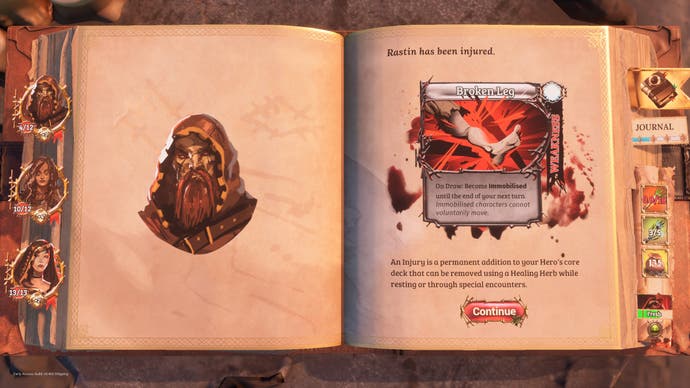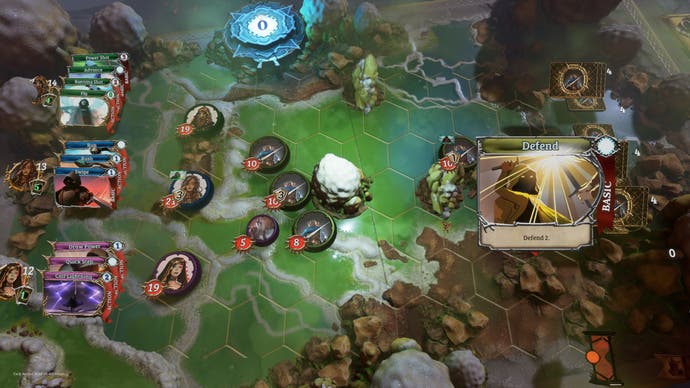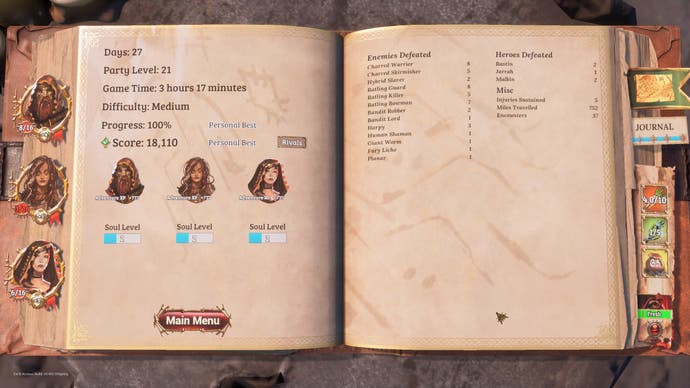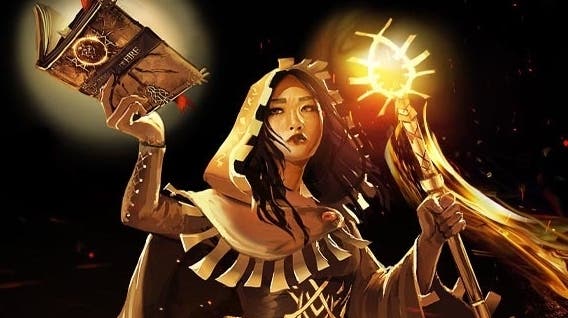Trials of Fire has that Slay the Spire magic
Conflagurations.
We're taking Rezzed online over the next few days, presenting sessions and bringing you highlights of what's new and interesting in the world of independent games. You can find more details on exactly what's going on over here, and we'll be bringing you more write-ups over the coming days.
Yes finally! I found and killed the god, but it was a bloody close-run thing. Two of my fighters went down and the third, the only one left, wasn't far off joining them. One basic slice attack did it, with only a sliver of health remaining. Glory was mine, victory against all odds.
Yeah OK Bertie don't get too carried away, you've hardly finished the game have you?
He's right, my other voice: I haven't finished the game. I've only really just begun. Trials of Fire is designed to be played over and over, like Slay the Spire, each time gradually unlocking and understanding more. My victory rewarded me with a new hero to use next time, and I earned soul levels I don't understand yet. Now, I pick another quest and jump back in, the world procedurally generating around me.

Trials of Fire is part deck-building, part RPG, part storybook, and you get one life to see how far you can make it. It's the work of teeny tiny UK studio Whatboy Games, which was created a couple of years ago by former Rocksteady (Batman) duo Adam Doherty and Dax Ginn. Trials of Fire has been on Steam Early Access since May 2019, and will be released later this year on PC, with tablets and consoles (Switch included) to follow in 2021.
It works like this. You pick a team of three (you only have three at the beginning), adjust their loadouts and choose a quest to take them on. This all plays out in a big book. When you're exploring, you are a cut-out bobbing around a scruffy map, investigating points of interest. When you get to one, the page turns and words describe what's going on. Maybe you've bumped into some ratlings with human slaves. What will you do? Help set the humans free, trade with the ratlings, or walk away?
Pressurising your decision are a few things. Food is a big concern. It depletes as you explore and if you reach starving, you'll begin taking damage, and as heroes don't have a lot of health to begin with - between 12-15 points - this represents a significant loss. Perhaps you could trade to get more food, perhaps you could kill them and steal it, but combat should never be entered into lightly because everything in Trials of Fire is tough.

When you enter combat, the pages of the book turn again and a lovely animation pops up to become a ruin or a cave or whatever setting you're fighting in. Your characters and enemies are represented by tokens on a hexagonal grid, and everything you do is governed by cards. What cards you have depends on your abilities you choose as you level up and the equipment you wear, a nice touch. Green items have one ability, blues have two, and orange legendaries have three. They're very fancy.
Cards are played by spending willpower, a resource shared among your team, and you don't get any willpower for free. Earning it means either recycling cards (discarding them) or playing a buff card, of which there are many types. The most common earn you willpower each round but there are cards which grant willpower on hit, or amass a bulk amount in one go. They, however, are costly in their own right. Managing your willpower gain is crucial.
You might want to recycle your warrior's three-card hand because you aren't in melee range, for example, and use your hunter's abilities instead, but do you buff your hunter for the next round or opt for damage now? Can you afford to wait? Wait too long and their melee attackers will be on you, and if they surround you, you could be in trouble.
Any enemies touching your hexagonal space can get a free combo hit whenever their friend hits you, which means ratling soldiers, however unspectacular they are, can relentlessly chip away at your health while also being hard to kill. Underestimate them at your peril! I did.
Movement becomes a key factor, then, and all classes have abilities for it - some can even fly. You can immobilise enemies, and they you, as well as reel them in and push them away. You can dash forward, hit and run - there are endless possibilities. But will you pull the cards you need at the right time? As in any deck-building game, the draw doesn't always go your way, and so there are card-draw abilities to mitigate against luck.
What I'm trying to do is give you a glimpse of the enormous tactical depth underneath the rather scruffy exterior of Trials of Fire, and I haven't even mentioned pet summons or spells, which can do all manner of mischievous things. There's a gravity well which pulls characters together from a large distance, setting them up wonderfully for a fireball spell of some kind, or a bolt which will go straight through them in a line.
I haven't mentioned tiredness either - another consideration while exploring. Fight while tired and you will suffer in the battle.
In short, Trials of Fire is a game about concentration. I've learnt that being careful pays dividends. Get sloppy and you will come unstuck. A broken leg (on my character, not me - that would be one brutal game!) taught me not to take on every storybook feat dangled before me, and a dead party taught me not to intervene in everyone's hard luck. Pick your battles and prepare for them.
So here I am, flush with the confidence of beating a campaign on my third try, and this time when I go back in, I do so understanding a bit more and having a bit more to play with. Let's see how far I get. I cannot pull myself away.



